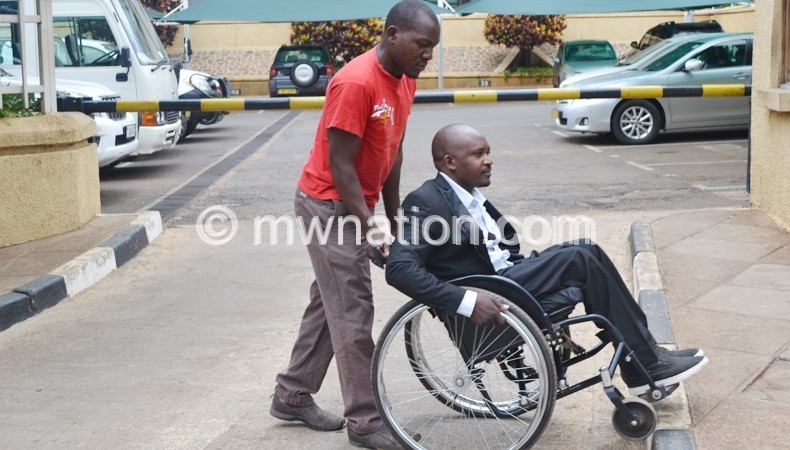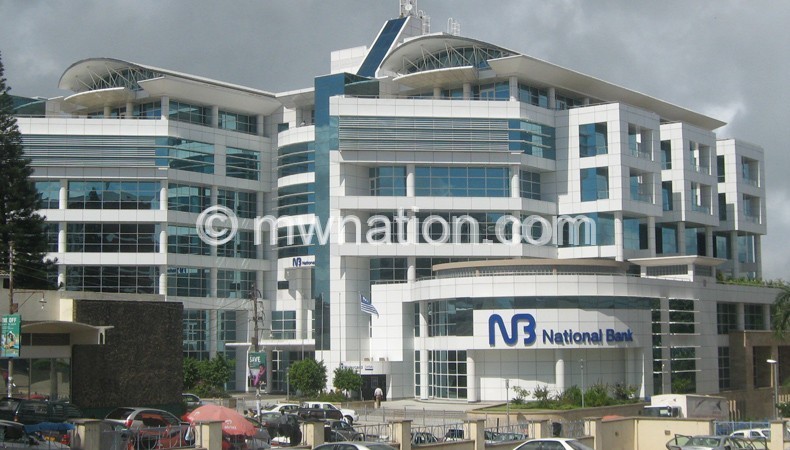Tears of the disabled
- Organisations snub Disability Act
Some ‘awkwardly’ crawl on all fours, even on muddy or dusty surfaces, heading to their begging posts along streets or alleys.
Others use sticks or clutches, grimacing as they exert the little energy left in their poorly fed bodies.

Their luckier colleagues sit on wheelchairs, hugely dependent on the fickle goodwill of their push-bike workers whose body language sometimes shows they may dump the jobs anytime soon, as they are literally sick and tired of pushing their ‘bosses’ who seem to be going nowhere, fast, in life.
The blind cautiously feel their way forward, either with their sticks or with others leading them on.
And the deaf? They are there, somewhere, in the mix of people with special needs.
The common denominator for all the physically challenged in Malawi is survival. No, it is desperate survival.
It seems they have no right to self-pity: they must move up and down to earn, or secure, a kwacha or two, to survive.
Some of them know that, by now, their lives should have been much more enjoyable.
They clapped hands when they heard, or learnt, that Parliament had passed the Disability Act—their legal guarantee, which meant, in part, that buildings and other infrastructure they must visit or use, in their uphill battle for survival, would become much more user-friendly.
But, alas, that was two years ago. Today, very little has changed. In most cases, nothing has changed.
Most of the people with disabilities cry, nay travail, internally. They know that the list of those who have let them down is long: government, some commercial banks, hospitals, schools, civil society and human rights organisations, politicians, relatives, friends…
Even the least-expected ‘culprits’ are also on the list: God’s prayer houses—churches, mosques and other places where people worship their Maker!
“Sure, we heard about the Disability Act. But where are its fruits? It’s still a headache for us [people with disabilities] to visit most buildings in the city, including schools, most banks or venues where we have to service electricity or water bills,” lamented Yabu Ching’oma of Lilongwe’s Area 36 Township.
The 34-year-old has been confined to a wheelchair since his family business vehicle he rode in, after he allowed a road contractor to drive it, was involved in a near-fatal accident.
A tyre burst triggered this accident, which saw the saloon car upended on an anthill.
The driver, who took over the steering wheel after alleging that the young man had been driving carelessly, sustained minor injuries.
But Ching’oma sustained a serious spine injury that saw him paralysed from the waist downwards.
And the lack of supporting infrastructure for the physically challenged multiplies their pain, he says.
“You see, when most buildings in town still have no special mobility enablers for us, despite the Disability Act, it shows that society is not celebrating us—it is merely tolerating us! Why are we being ignored and oppressed like this? Until when will this gross unfairness go on?” Ching’oma asked, his voice rising to an emotional quiver.
“If you notice, this is why we, people with disabilities, suffer in silence. We also want to be up and about by going to wedding ceremonies, football matches or visiting friends and relatives in offices. But we cause embarrassing scenes as we try to go up and down [non-compliant] skyscrapers or other venues, described as difficult or no-go areas, even by the people we employ to be pushing our wheelchairs. The result is that we are forced to stay at home, in a sort of self-imposed house-arrest.”
He appealed to the government to fully enforce the Disability Act.
“It is only when government shows ‘real’ seriousness over this Disability Act that we will see all banks, schools, hospitals and even homes becoming much more accessible for us. That move will pave the way for us to engage in gainful employment and businesses that can enable some of us to marry and pursue other self-development plans that now seem mere pipedreams,” he added.
Ching’oma expressed shock that most churches and some mosques are openly non-responsive to the Disability Act.

In separate interviews, some leaders of major religious bodies, banks and civil society organisations admitted that their structures were built several years, if not decades, ago, when the Disability Act was a long way off. They also admit that they should have been proactive in considering their brothers and sisters with special needs, let alone after the Disability Act was passed.
“Definitely, one of the passions of our Lord Jesus Christ was considering and working for vulnerable people. But, in all honesty, over the past two years, I don’t think the [Malawian Christian] church has done much in initiating expected changes and improvements concerning the Disability Act,” Father Emmanuel Chimombo of the Catholic Church stated.
“It’s not that we have ignored these brothers and sisters. We have these people at heart, but I think this topic is our wake-up call that the church needs to start implementing the Disability Act actively,” added Chimombo, whose church has prayer houses across Malawi’s entire length and breadth.
Church of Central Africa Presbyterian (CCAP) Nkhoma Synod moderator, Reverend Dr. Chatha Msangaambe, said: “There is definitely a need for all churches to comply with the Disability Act. I have seen some churches, like Kaning’a CCAP in Lilongwe, doing much in making life bearable for the persons with disabilities, but very little has changed in some churches, especially in rural areas,” he noted.
Msangaambe said at one time, he was touched when he saw how persons with disabilities moved with great difficulties during a graduation ceremony at The Great Hall of the University of Malawi’s Chancellor College in Zomba, which then was not modified to cater for those with mobility special needs.
The Muslim Association of Malawi (MAM) says it is trying its best to be compliant to the Disability Act.
“Except for rare cases, most of the mosques do have one step [ramps], to accommodate everyone. This translates into 70 percent [of compliance across the country],” MAM secretary general, Salmin Idruss Omar, said.
As further proof of MAM’s care for the persons with disabilities, Dr. Omar pointed to efforts to acquire and distribute wheelchairs to those with special needs.
The MAM official said across the country, much work needs to be done to implement the Disability Act, which requires that building owners make adjustments to their old structures and redesign new ones into compliance.
Omar stressed the need to register all persons with disabilities to know the extent of the problem and to initiate related assistance.
Several banks we engaged on this subject appeared taken aback by the fact that many of their own, or rented, buildings are not user-friendly to persons with disabilities. And except for National Bank of Malawi (NBM), most of them did not return our questionnaires despite promising to.
NBM corporate affairs manager Annie Magola responded: “As you might be aware, National Bank has been refurbishing its service centres since 2002, starting with its flagship service centre at the City Centre in Lilongwe, which opened its doors in 2004.
“In this refurbishment programme, we took and continue to seriously take, into account the needs of our customers with physical disabilities. We have, therefore, made it a point that all our service centres should have easy access for customers with physical disabilities. All our service centres have ramps, for easy movement of customers on wheelchairs, those using clutches and other forms of devices or aids.
“At NBM Towers, where our head office and Henderson Street Service Centre are housed, we have very modern facilities for persons with physical disabilities. We have wider lifts for wheelchairs and washroom facilities for persons with disabilities on the ground floor. We also have a paraplegic lift, which serves the ground and mezzanine floors, where our frontline business operations are located.
“Further to this, all our auto teller machines [ATMs] are positioned at user-friendly heights for the convenience of all our customers, including those with physical disabilities.”
Magola said following the bank’s sensitivity to people with disabilities, the Organisation of People with Disabilities certified that NBM Towers meets the standards for a physical disabilities-friendly building.
Asked recently how the Disability Act ought to be implemented, Transport and Public Works Minister Francis Kasaila was forthright.
“With the passing of the disability law by Parliament, government expects that all structures will be disability-friendly. To provide the necessary improvements on the existing structures may take some time. But it is the requirement that disability issues must be considered for all new structures before the city councils can issue any construction permits,” he replied.
Ministry of Gender, Children, Disability and Social Welfare spokesperson Lucy Bandazi admitted that the Disability Act has not attracted extensive compliance although efforts are being made towards this end.
Bandazi pointed out that building owners have a lot to do before they attain compliance as the Act calls on them to put in place facilities that are universally designed to be used by anybody.
“Such facilities include ramps, elevators, hand rails, wide and flexible doors, surfaces that are not slippery and other relevant facilities,” she stated.
Asked whether even sophisticated structures like Parliament Building in Lilongwe need to make adjustments that will benefit persons with disabilities, Bandazi agreed and said the appointment of First Deputy Speaker of Parliament Clement Chiwaya, who is a wheelchair user, earlier this year, was historic.
“Parliament building is one of the accessible infrastructures in the country that has taken into consideration universal-design standards. However, from the look of things, it was overlooked that one day, a Speaker, or Deputy Speaker, shall be a wheelchair user [to sit on a high-point leadership chair in the House].
“As such, the said modifications had to be made. The modification that was done in Parliament, to accommodate the Deputy Speaker, is what is called ‘reasonable accommodation’. Reasonable accommodation is the modifications and adjustments tailor-made for an individual to function in a particular situation or environment,” she informed.
Bandazi said government is developing Minimum Access Standards that will be used by the general public to guide them during planning and construction phases, to take into consideration access needs of all, in line with the Disability Act.
And Ching’oma’s parting words? “I hope, after knowing our plight, the government and advocates like civil society and human rights organisations will demand more action in the implementation of the Disability Act.





